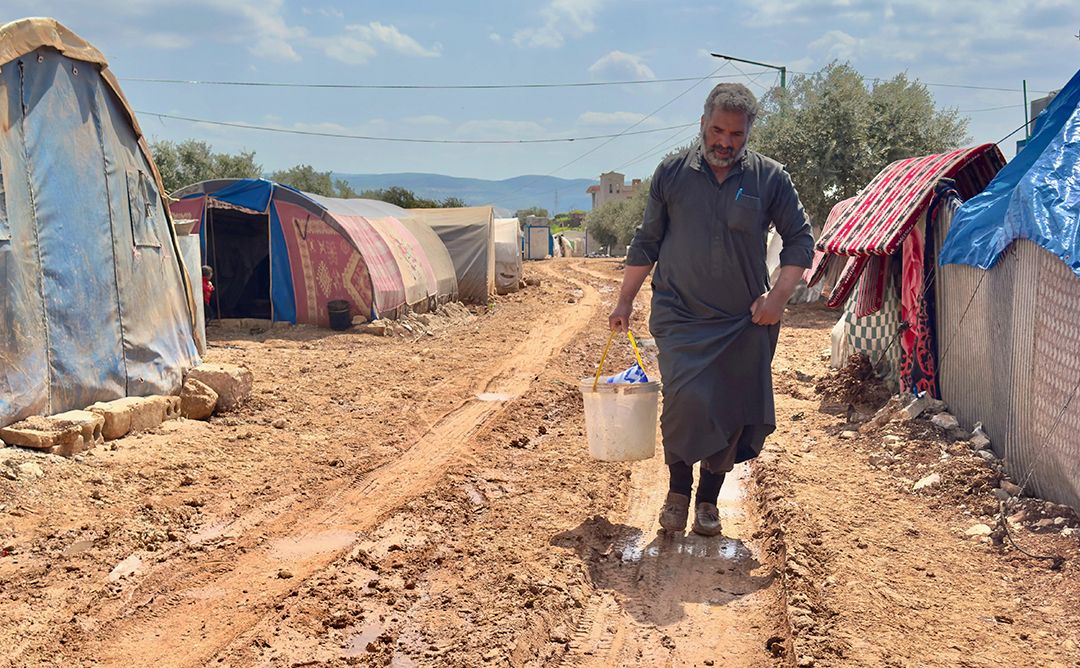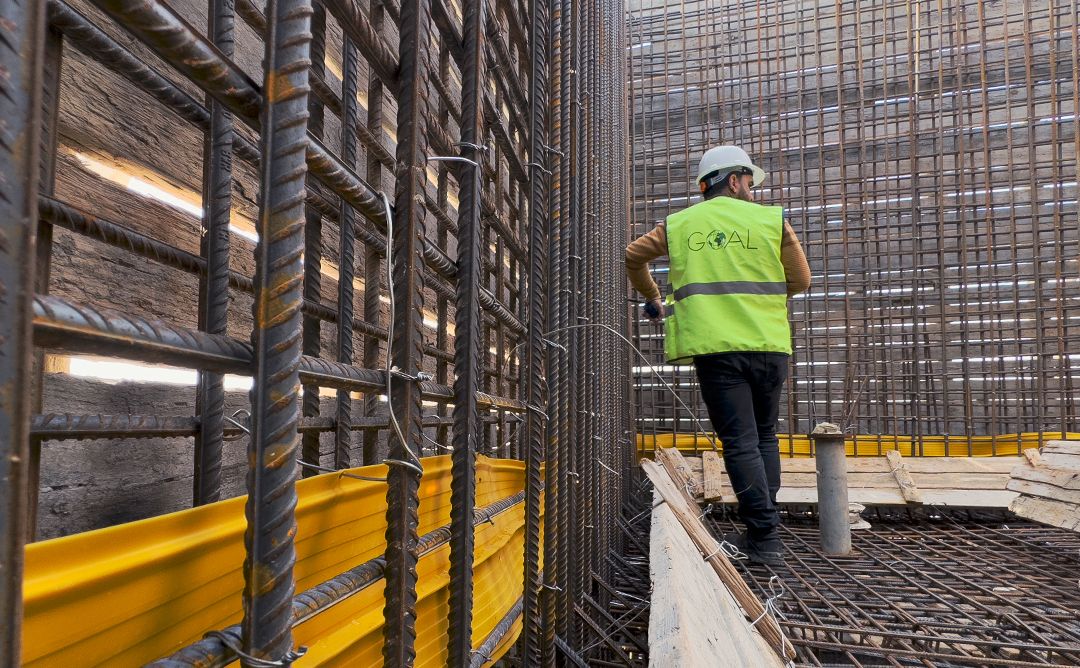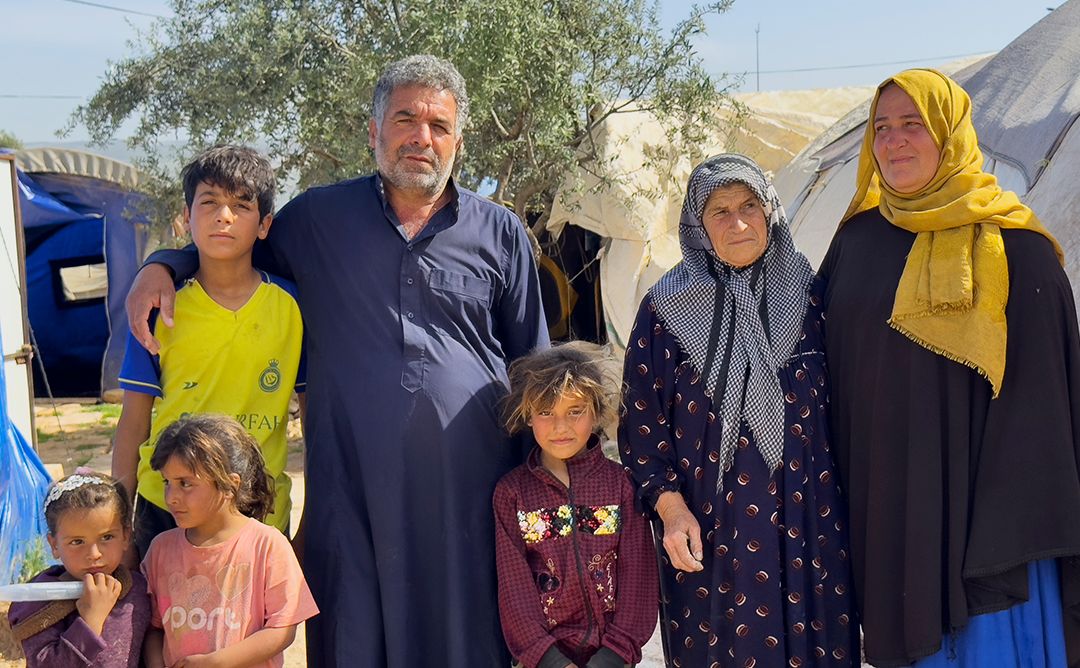 Stories
Stories
August 1, 2024 • 4 min read
Restoring Water after Disaster
The devastating earthquakes that hit Türkiye and Syria in February 2023 worsened the suffering of people in Northwest Syria. Communities that have already endured endless torment with 13 years of armed conflict and prolonged displacement.
Over 10,000 buildings were destroyed, and thousands of families lost their homes, as well as access to essential services like clean water.
Thanks to vital funding from the European Union and other donors, GOAL teams have worked hard since the earthquakes to support families impacted by the disaster. This includes ensuring access to clean, piped water.
A Family’s Struggle
“Are we not human?” Hussein, a 48-year-old father of nine, asks mournfully.
His family has been living in Al-Wadah displacement camp in Syria’s Northern Aleppo since the earthquakes destroyed their home in Jandires town last February.
Describing the challenges faced by displaced families like his, Hussein shared, “There is no medicine, schools, roads and, most importantly, no water or hygiene. Perhaps we are not considered human after all.”
The struggles Hussein expressed are not unique to his family.
Every day, GOAL teams working on the ground in Northwest Syria meet hundreds of families that experience the same sense of hopelessness.
The earthquakes in February 2023 damaged homes and critical infrastructures, pushing hundreds of thousands of Syrians to their limits.
The devastation placed additional strain on communities that were already reeling from over a decade of conflict, economic downturn and the COVID-19 pandemic.

Unsafe Water
Hussein’s wife, Amina, knows the importance of avoiding water that may be unsafe to use, but the lack of options makes her feel powerless.
“The water we get isn’t sterilised, and my children are constantly sick with diarrhoea and vomiting,” she explains.
Since moving to the displacement camp, her family has had to depend on trucks brought in by private vendors for water.
But even this method is unreliable. The displacement camp was built on agricultural land, and heavy downpours often lead to flooding that can block the roads into the camp.
In such instances, it often falls on children to fetch water from the trucks.
“In rainy weather, it’s especially tough as the camp’s roads turn into mud,” explains Amina and Hussein’s 12-year-old son, Mudar.
“We have to trek over 500 meters in the mud to reach the water truck and fill the cans. Unfortunately, the water we bring back is often mixed with dirt, which we can’t drink,” says Mudar.
And when the water trucks fail to visit their camp, Hussein and Amina have no choice but to resort to extreme measures.
“Once, for cleaning,” shares Amina, “I had to collect water from a pool of rainwater in the camp.”
Hussein then adds, “Sometimes we’re forced to use the rainwater collected from the roof of our tent despite knowing it’s polluted.”
Delivering through Conflict and Disasters
Regular access to clean water is essential for the survival of communities already vulnerable to ongoing crises.
But in Northwest Syria, more than half of the region’s 5.1 million population relies on potentially unsafe water sources.
And according to the United Nations, among the 2 million displaced people in Northwest Syria living in camps and informal settlements, only 27% of households are connected to a water network.

In fragile regions like Northwest Syria, where the public capacity to address risks is limited, medium to long-term humanitarian programmes in the Water, Sanitation, and Hygiene (WASH) and other essential service areas can support vulnerable families’ resilience.
GOAL teams have been supporting water systems across Northwest Syria since 2014. Working hard to ensure the water networks continue to operate despite the ongoing conflict.
Thanks to funding from our donors such as EU Humanitarian Aid and others, GOALies are helping supply clean tap water to around 800,000 people across Northwest Syria.
In recent years, GOAL teams expanded the WASH programme in Northwest Syria to reach more displaced communities living in camps and informal tent settlements.
And since last year’s devastating earthquakes, GOAL has further stepped up these efforts. Clean water access has been provided or restored for over 130,000 individuals impacted by the disaster.
A Better Future
Hussein was relieved when he saw the installation of the new water pipelines in Al-Wadah.
“When GOAL tested the system, and we saw that the water was flowing from the tap, the whole camp felt like the site of a feast,” he says.
After the completion of the water tower, families living in the camp will have regular access to piped, drinkable water from a safe and reliable source.

